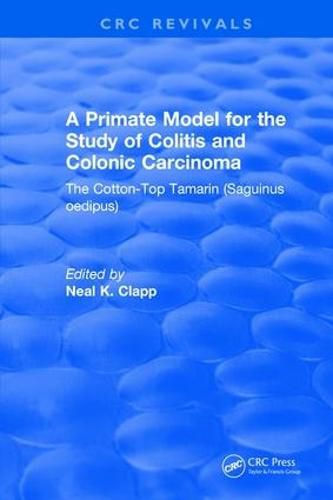Readings Newsletter
Become a Readings Member to make your shopping experience even easier.
Sign in or sign up for free!
You’re not far away from qualifying for FREE standard shipping within Australia
You’ve qualified for FREE standard shipping within Australia
The cart is loading…






A Primate Model for the Study of Colitis and Colonic Carcinoma describes recent observations of the prevalence, pathogenesis, natural history, and time-course of idiopathic colitis and colonic carcinoma in the Cotton-Top Tamarin (CTT) model. Results of colonoscopy and mucosal biopsy are shown to evaluate the therapeutic efficacy of new anti-colitic agents. The contributions of antigenic profiles as a function of disease state, occurrence of extra-intestinal manifestations, and possible causal agents of colitis are also discussed. Prevalence of spontaneous CTT colonic carcinoma is considered from genetic influence, from promotion by colitis, and through the use of diagnostic and prognostic tools such as flow cytometry. Changes in fecal steroids, serum markers, colonic glycoprotein, polyamine metabolism, and immunobiology of CTTs are discussed in regard to disease condition. The book is an essential reference on the CTT model for gastroenterologists, oncologists, and all researchers interested in digestive diseases.
$9.00 standard shipping within Australia
FREE standard shipping within Australia for orders over $100.00
Express & International shipping calculated at checkout
A Primate Model for the Study of Colitis and Colonic Carcinoma describes recent observations of the prevalence, pathogenesis, natural history, and time-course of idiopathic colitis and colonic carcinoma in the Cotton-Top Tamarin (CTT) model. Results of colonoscopy and mucosal biopsy are shown to evaluate the therapeutic efficacy of new anti-colitic agents. The contributions of antigenic profiles as a function of disease state, occurrence of extra-intestinal manifestations, and possible causal agents of colitis are also discussed. Prevalence of spontaneous CTT colonic carcinoma is considered from genetic influence, from promotion by colitis, and through the use of diagnostic and prognostic tools such as flow cytometry. Changes in fecal steroids, serum markers, colonic glycoprotein, polyamine metabolism, and immunobiology of CTTs are discussed in regard to disease condition. The book is an essential reference on the CTT model for gastroenterologists, oncologists, and all researchers interested in digestive diseases.